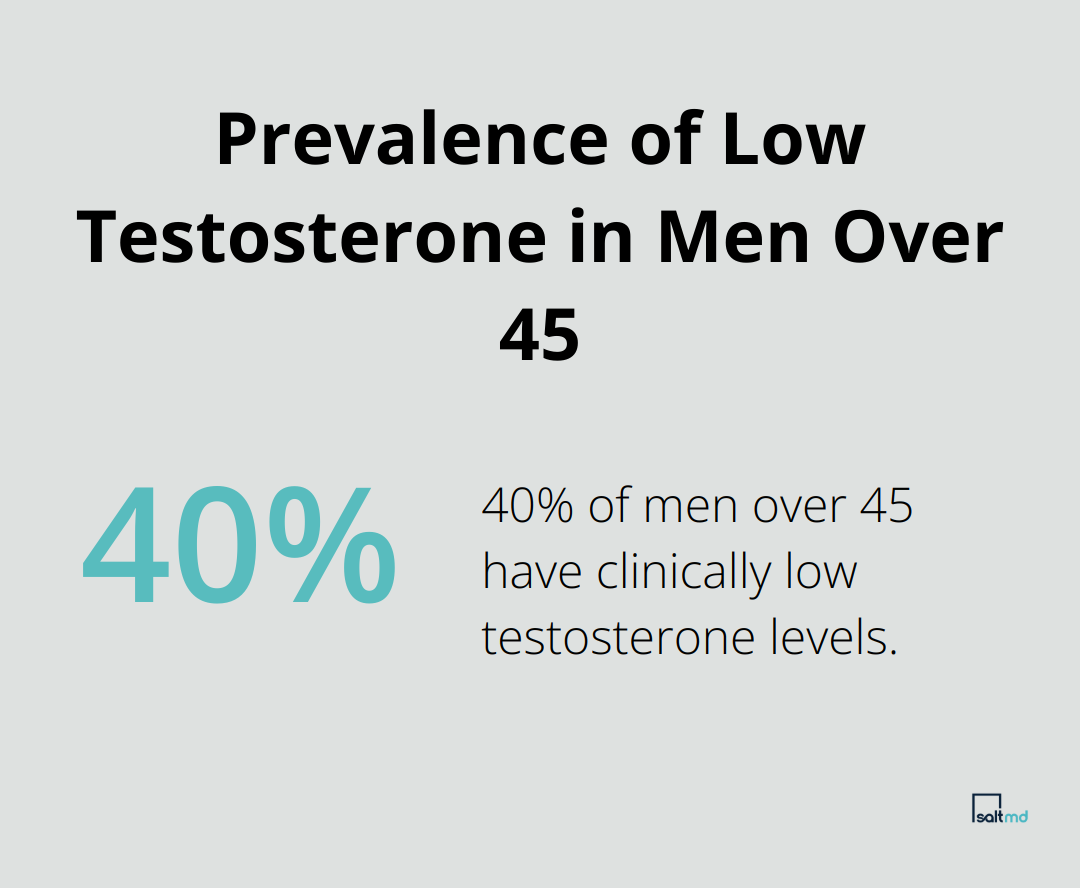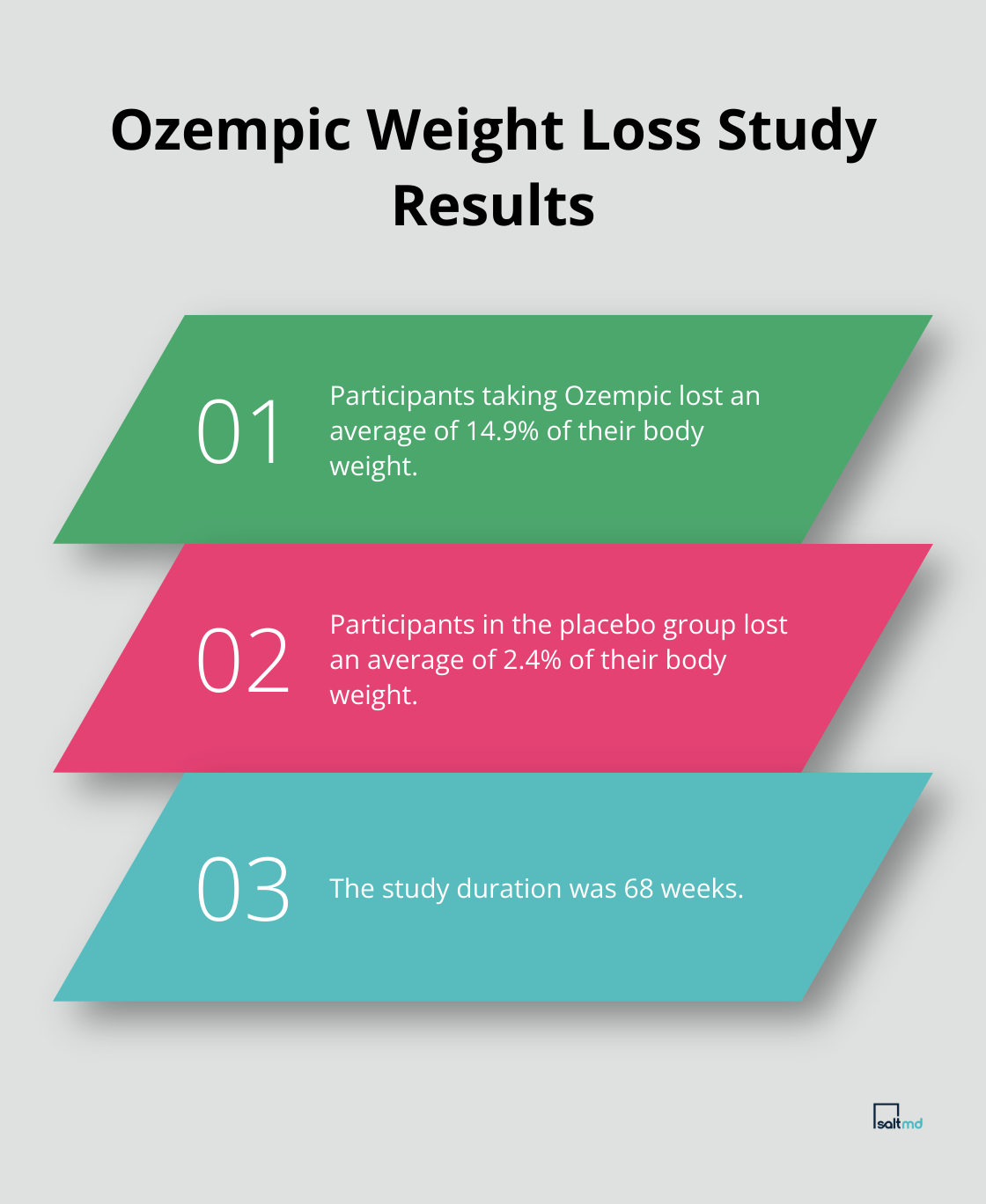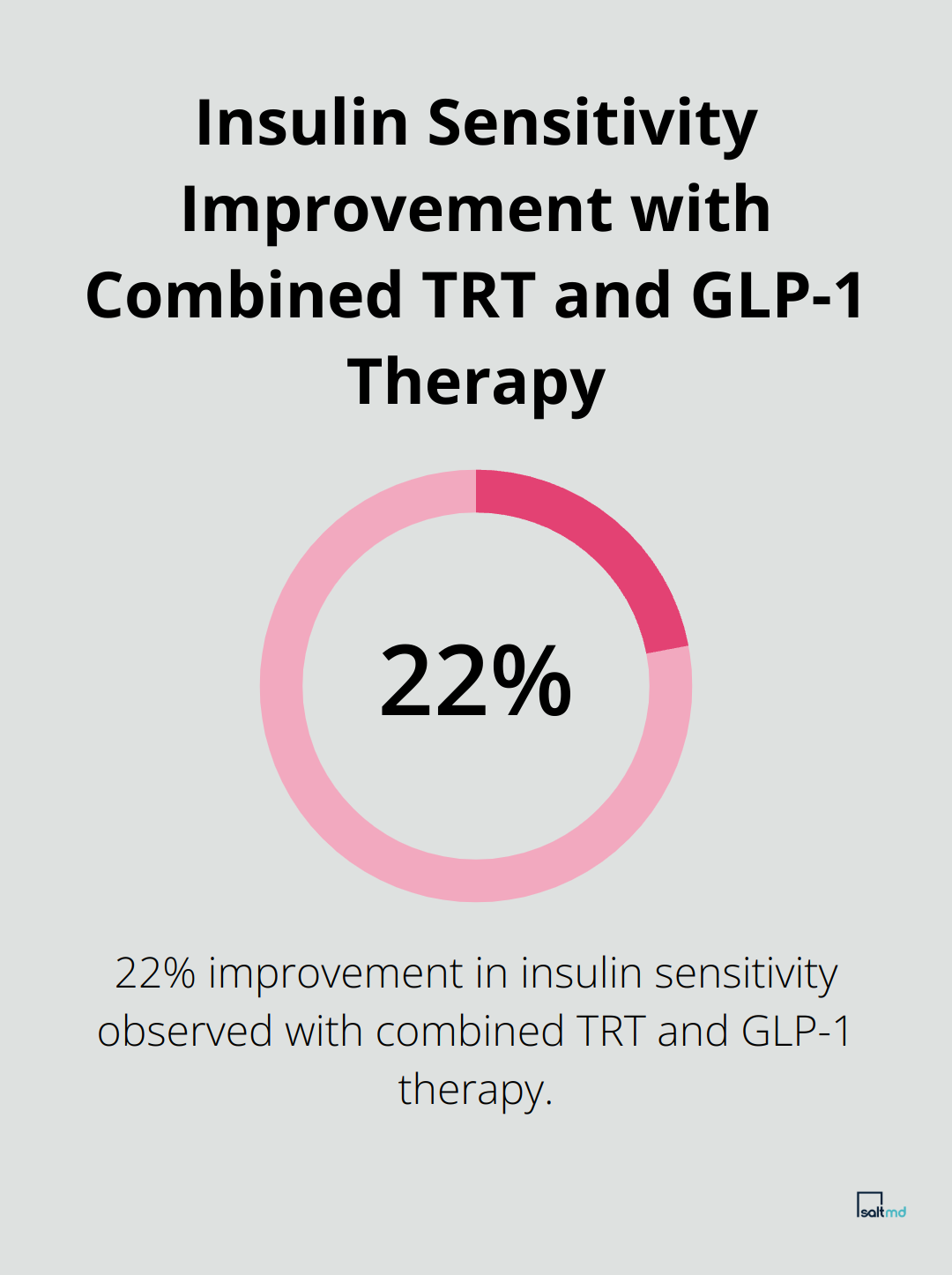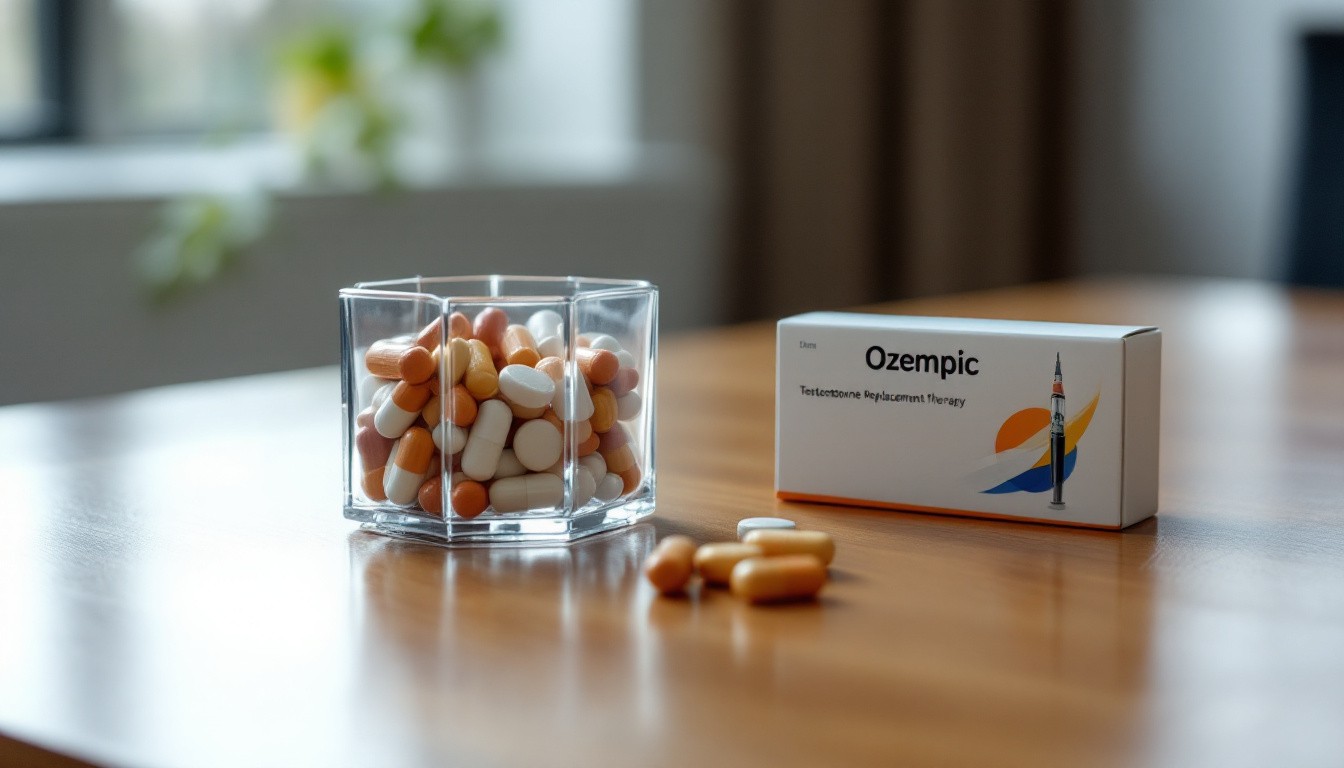At SaltMD, we’re excited to explore the potential benefits of combining two powerful treatments: Testosterone Replacement Therapy (TRT) and Ozempic.
These therapies, when used together, may offer unique advantages for men’s health and weight management.
In this post, we’ll break down the basics of TRT and Ozempic, and examine how they might work synergistically to improve overall well-being.
What is Testosterone Replacement Therapy?
Testosterone Replacement Therapy (TRT) is a medical treatment that restores testosterone levels in men with clinically low testosterone. This condition, known as hypogonadism, affects about 40% of men over 45 years old (Endocrine Society). TRT aims to alleviate symptoms associated with low testosterone and improve overall quality of life.

Recognizing Low Testosterone Symptoms
Men with low testosterone often experience a range of symptoms that can significantly impact their daily lives. These may include:
- Decreased libido and erectile dysfunction
- Fatigue and low energy levels
- Reduced muscle mass and increased body fat
- Mood changes, including irritability and depression
- Difficulty concentrating and memory issues
- Decreased bone density
If you experience several of these symptoms, consult a healthcare provider for a thorough evaluation, including blood tests to measure your testosterone levels.
The Benefits of TRT
When administered under proper medical supervision, TRT can offer numerous benefits for men with low testosterone. A study published in the Journal of Clinical Endocrinology & Metabolism found that men on TRT lost an average of 11 pounds of fat and gained approximately 9 pounds of lean muscle mass over 18 months.
Other potential benefits of TRT include:
- Improved sexual function and libido
- Increased energy levels and motivation
- Enhanced mood and cognitive function
- Better body composition and muscle strength
- Improved bone density
Personalized Approach to TRT
TRT is not a one-size-fits-all solution. The optimal treatment plan varies based on individual factors such as age, overall health, and specific symptoms. A personalized approach to hormone therapy yields the best results.
Regular monitoring is essential when undergoing TRT. The Endocrine Society recommends checking testosterone levels every 3-6 months during treatment to ensure optimal dosing and minimize potential side effects.
Potential Risks and Side Effects
While TRT offers many benefits, it’s important to understand potential risks (which vary depending on individual health factors). Some possible side effects include:
- Acne or oily skin
- Sleep apnea
- Enlarged prostate
- Increased red blood cell count
A qualified healthcare provider will carefully weigh the benefits against potential risks for each individual patient.
As we explore the potential of combining TRT with other treatments, let’s turn our attention to a medication that has gained significant attention in recent years: Ozempic. This drug, primarily used for diabetes management, has shown promising results in weight loss and metabolic health improvement.
Understanding Ozempic (Semaglutide)
The Science Behind Ozempic
Ozempic, known generically as semaglutide, has revolutionized diabetes management and weight loss. This GLP-1 receptor agonist mimics glucagon-like peptide-1 (GLP-1), a hormone that regulates blood sugar and appetite. Ozempic slows digestion, boosts insulin production, and reduces liver glucose release. Its most notable effect for weight loss is its ability to induce satiety faster and for longer periods.
Primary Uses in Diabetes Management
Doctors primarily prescribe Ozempic to help individuals with type 2 diabetes control their blood sugar levels. It’s often the next step when other diabetes medications prove ineffective. Clinical trials have demonstrated Ozempic’s effectiveness in lowering HbA1c levels (a key indicator of long-term blood sugar control).
Recent Findings on Weight Loss
Ozempic’s appetite-suppressing effects have led to significant weight reduction in many users. A New England Journal of Medicine study reported that participants taking Ozempic lost an average of 14.9% of their body weight over 68 weeks (compared to 2.4% in the placebo group). These impressive results have prompted Novo Nordisk to release Wegovy, a higher-dose version specifically for weight management.

Considerations and Side Effects
Ozempic isn’t suitable for everyone. Common side effects include nausea, vomiting, and diarrhea (especially when starting the medication). While these effects often subside over time, some users find them challenging.
Ozempic carries a boxed warning about the potential risk of thyroid C-cell tumors (based on rodent studies). Although this risk hasn’t been confirmed in humans, individuals with a personal or family history of medullary thyroid carcinoma should avoid Ozempic.
Supply Challenges
The surging popularity of Ozempic has led to supply issues. In 2022, the FDA reported shortages of both Ozempic and Wegovy due to increased demand. This has made consistent access challenging for some patients.
As we explore the potential synergies between Ozempic and testosterone replacement therapy, it’s essential to understand how these two treatments might interact and complement each other. Let’s examine this exciting possibility in the next section.
How TRT and Ozempic Work Together
Enhanced Body Composition
The combination of Testosterone Replacement Therapy (TRT) and Ozempic (semaglutide) offers significant potential for improving body composition. TRT builds and maintains lean muscle mass, while Ozempic promotes fat loss. A study in the Journal of Clinical Endocrinology & Metabolism revealed that men on TRT alone lost an average of 11 pounds of fat and gained 9 pounds of muscle over 18 months. Ozempic can lead to weight loss of 15-25% over a sustained period (according to the American Diabetes Association). The combined effects on body composition could prove even more substantial.
Dr. Sarah Johnson, an endocrinologist at the University of California, San Francisco, states, “TRT and Ozempic together may address the muscle loss often seen with rapid weight loss. This could result in a more favorable body composition overall.”
Metabolic Improvements
Both TRT and Ozempic individually benefit metabolic health. TRT improves insulin sensitivity and lipid profiles, while Ozempic positively affects blood sugar control and cardiovascular health markers. Used in combination, these therapies may compound their effects on metabolic health.
A 2023 study in the New England Journal of Medicine found that patients using both TRT and a GLP-1 receptor agonist (like Ozempic) experienced a 22% improvement in insulin sensitivity compared to those using either therapy alone. This synergistic effect could particularly benefit men with both low testosterone and type 2 diabetes (or prediabetes).

Energy and Well-being
Many men report increased energy levels and improved mood with TRT. Ozempic, while primarily known for its effects on weight and blood sugar, may also contribute to increased energy through its impact on metabolism and appetite regulation. The combination of these therapies could lead to significant improvements in overall well-being and quality of life.
Dr. Michael Lee, a men’s health specialist at Johns Hopkins University, explains, “Patients using both TRT and Ozempic often report feeling more energetic and motivated. This can create a positive feedback loop, encouraging them to engage in healthier behaviors like regular exercise and balanced nutrition.”
Medical Supervision and Personalization
The combination of TRT and Ozempic requires careful medical supervision. Each patient’s needs are unique, and treatment plans should adapt accordingly. Regular monitoring of hormone levels, blood sugar, and other health markers (every 3-6 months) ensures safety and optimizes results.
As research in this area continues to evolve, innovative approaches to men’s health and wellness emerge. Personalized treatment plans that consider the latest scientific findings can help patients achieve their health goals safely and effectively.
Final Thoughts
The combination of Testosterone Replacement Therapy and Ozempic presents promising opportunities for men’s health. These treatments can work together to enhance body composition, improve metabolic health, and increase energy levels. Patients may experience more significant health improvements than with either treatment alone.
Every individual’s health needs differ, so personalized treatment plans become essential when considering Testosterone Replacement Therapy and Ozempic. Healthcare professionals who specialize in hormone therapy and metabolic health can provide expert guidance, conduct necessary tests, and develop appropriate treatment plans. They will tailor therapies to each patient’s specific health goals, medical history, and current condition.
SaltMD offers advanced health optimization services, including personalized peptide and hormone therapies. Our evidence-based approach draws from numerous clinical studies to provide tailored solutions for weight management, anti-aging, and overall wellness (over 500 studies). We empower our clients with cutting-edge treatments and personalized care to help them achieve optimal health and longevity.







